Effective Smells to Deter Squirrels: A Comprehensive Guide
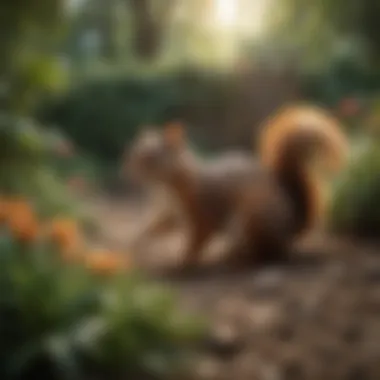
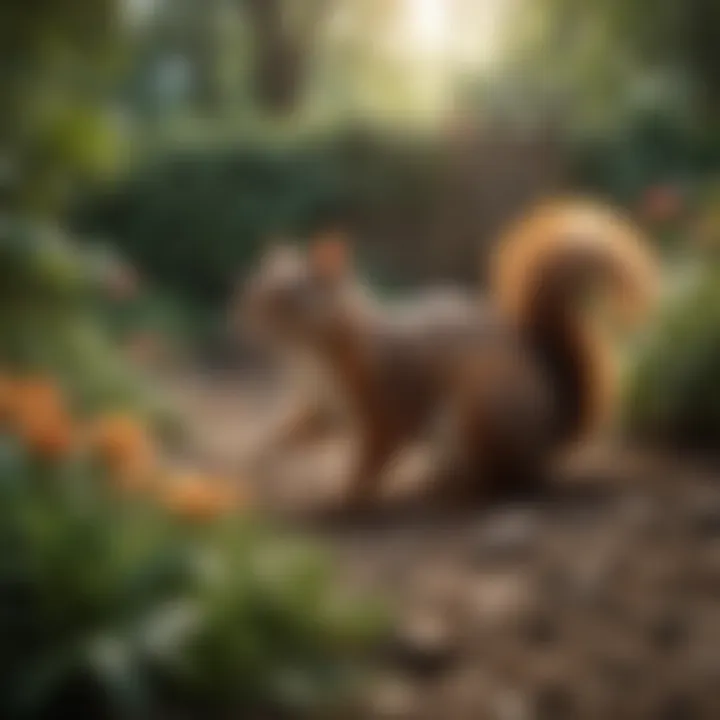
Intro
Squirrels are known for their playful antics and bushy tails, yet they can pose a threat to gardens and homes. Their increasingly agile behaviors and evolving foraging strategies often lead to the destruction of plants and crops, leaving homeowners frustrated. This guide delves into the role of scent as a barrier against such invasions. By understanding both the biology of squirrels and the effectiveness of specific smells, readers can adopt informed strategies for peaceful coexistence with these lively creatures.
Key Insights and Trends
Understanding Squirrel Behavior
To effectively deter squirrels, it's essential to comprehend their behavior. Squirrels rely heavily on their sense of smell to locate food and identify safe nesting areas. This keen sense makes them vulnerable to certain scents that can disrupt their foraging routines.
Research indicates that squirrels use olfactory cues not just for food identification, but also for social interactions. Scents can signal danger, hunger, or competition amongst other squirrels. Therefore, the strategic use of certain smells can alter their presence in your yard.
Effective Odor Deterrents
Many homeowners have found success by employing specific odors that squirrels find unpleasant. These include:
- Cinnamon: A potent scent that can confuse and repel squirrels.
- Peppermint: Known for its strong aroma, peppermint oil can deter these critters when used effectively.
- Vinegar: While not exactly pleasant for humans, its sharp scent is often unwelcoming for squirrels.
Each smell disrupts a squirrel's routine in various ways. Using these scents can range from creating an unpleasant environment to masking food smells that attract them.
Practical Tips and How-To Guides
Application Methods for Scent Deterrents
Implementing odor-based deterrents requires careful application to ensure effectiveness. Here are practical steps to consider:
- Choose the Right Scents: Based on the findings, select a few scents that have proven effective against squirrels.
- Create Scent Mixtures: Mix essential oils, vinegar, or powdered spices with water in a spray bottle. A common ratio is one part scent to two parts water.
- Target Specific Areas: Focus on areas where squirrels frequently appear or have caused damage.
- Reapply Regularly: Scents can fade over time, especially with rain or watering. A schedule for reapplication helps maintain effectiveness.
- Combine with Physical Barriers: Use dowel rods or netting in conjunction with scent deterrents to maximize your success.
"Understanding the interaction between squirrels and their environment is vital for effective management. Odor-based methods are just one part of a holistic approach to managing wildlife interactions."
Monitoring Efficacy
After applying scent deterrents, it is crucial to monitor your garden for signs of squirrel activity. Take note of:
- Changes in squirrel frequency.
- Plants that are less damaged or untouched by squirrels.
By evaluating these factors regularly, adjustments to your strategies can be made as needed.
Understanding Squirrel Behavior
Understanding the behavior of squirrels is critical to effectively deter them from gardens and homes. Squirrels are resourceful animals, and comprehending their habits can significantly influence how one uses scent deterrents. Intricately linked to survival, their activities include foraging for food and seeking safe spaces for nesting. Knowing these aspects helps in identifying which scents might disrupt their routines.
The Biology of Squirrels
Squirrels belong to the family Sciuridae, which consists of small to medium-sized rodents. These creatures have sharp claws and strong teeth, enabling them to climb trees and gnaw through various materials. Evolutionarily, they are well-adapted to navigate urban landscapes, making them common visitors in neighborhoods. The physiological design, including keen eyesight and acute hearing, allows them to detect potential threats, including various odors. This innate sensitivity to smell plays a crucial role in their foraging behavior.
Foraging and Nesting Practices
Squirrels exhibit unique foraging strategies. They often cache food by burying nuts and seeds to retrieve later, showcasing their planning capabilities. This behavior indicates their reliance on memory and scents to locate stored items. Nesting usually occurs in tree hollows or built nests high above the ground, providing safety from predators. Understanding these patterns gives valuable insight into when and where to apply scent barriers effectively. Knowing when squirrels are most active can enhance the successful deployment of deterrent smells.
Role of Smell in Squirrel Habitats
Smell is vital for squirrels as it guides them in several important functions. Scent helps in identifying food sources, marking territories, and signaling danger. Squirrels utilize pheromones for communication with fellow squirrels, particularly during mating seasons. When considering deterrents, it is important to grasp that any strong smell can disrupt these natural behaviors. Implementing effective smells can confuse squirrels and deter them from entering gardens or invading homes, taking advantage of their reliance on olfactory cues.
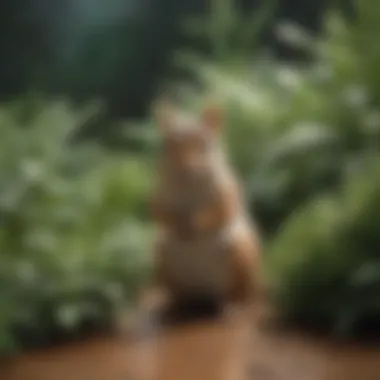
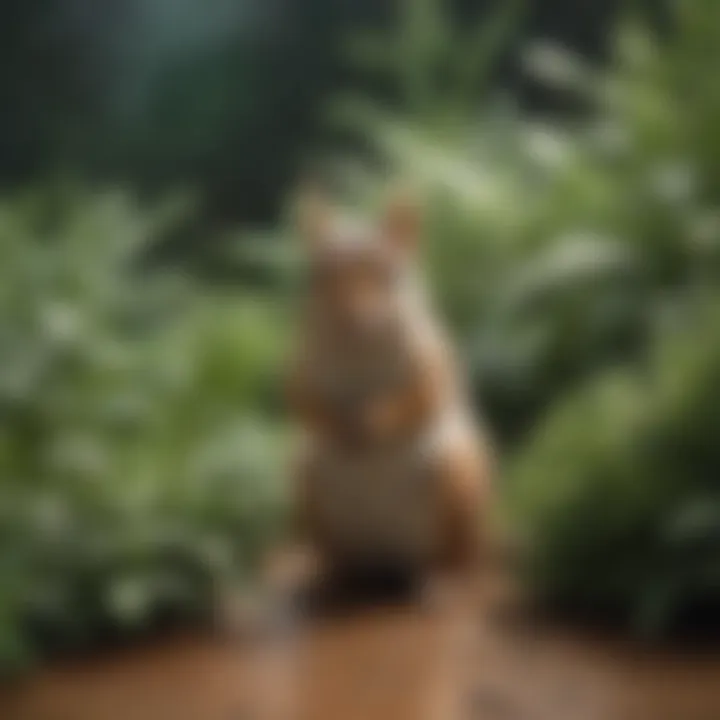
"Understanding squirrel behavior is the first step in employing effective deterrents."
By grasping these elements, homeowners can select the most appropriate smell-based strategies to maintain the ecological balance of their outdoor spaces. This foundation sets the stage for discussing the various scent repellents and their application methods.
The Science Behind Scent Repellents
Understanding the science behind scent repellents is crucial when focusing on deterring squirrels effectively. Squirrels, like many animals, rely significantly on their sense of smell to navigate their environment, locate food, and avoid danger. This natural instinct highlights the potential for using specific odors as a deterrent. The combination of behavioral studies and scientific inquiry allows homeowners to harness these scents for practical use in gardens and around homes.
How Smells Affect Animal Behavior
Smell plays a pivotal role in animal behavior, impacting various activities such as foraging, mating, and territory establishment. In the case of squirrels, certain scents can trigger aversive reactions. For example, strong smells may disrupt their feeding patterns or alert them to potential threats. Research indicates that squirrels are particularly sensitive to odors reminiscent of predators or substances that signal danger. By leveraging this knowledge, homeowners can employ specific scents like peppermint oil or cayenne pepper as effective deterrents.
Threshold Levels for Scent Detection
Every animal has a threshold level for detecting scents, which varies widely between species. For squirrels, the olfactory receptors are finely tuned to pick up even faint odors in their surroundings. This sensitivity allows them to detect food sources from significant distances. Understanding this threshold helps in determining how concentrated a scent needs to be to achieve a deterring effect. Studies suggest that higher concentrations may be more effective at repelling squirrels than more diluted solutions, but there lies a balance to ensure safety and minimize ecological disruption.
Toxicity and Safety of Scents
The safety of using various scents is a significant consideration. While many natural deterrents, such as peppermint oil, are generally safe for the environment, others may pose risks to non-target species or the ecosystem at large. It is essential to evaluate the potential toxicity of the chosen scents, especially if they are used in garden settings. Homeowners should prioritize natural repellents that minimize harm. Moreover, ensuring that the selected scents do not adversely affect plants, pets, or beneficial wildlife is critical. Engaging with reputable sources of information can provide insight into best practices for using scent repellents safely.
Common Smells That Deter Squirrels
Understanding common smells that deter squirrels can provide a natural and effective strategy for managing these persistent pests. Utilizing specific scents not only helps in keeping them away but also minimizes potential environmental impact compared to chemical solutions. This section will focus on several well-known smells that have shown effectiveness in repelling squirrels, discussing their attributes and the benefits they offer to homeowners.
Peppermint Oil
Peppermint oil is a potent scent that many find effective against squirrels. The strong aroma it emits is often overwhelming for these animals, making it a preferable deterrent. When applied strategically, it can signal to squirrels that an area is unsuitable for their presence. Homeowners can use peppermint oil by mixing a few drops in water and spraying it in areas where squirrels might invade. It is important to note that peppermint oil needs to be reapplied periodically, especially after rainfall.
Cayenne Pepper
Cayenne pepper is another strong option for deterring squirrels. The pungent and spicy aroma can deter squirrels from foraging in gardens. This particular scent not only repels them but can also create an unpalatable experience if they attempt to eat plants or seeds treated with it. Spreading cayenne pepper around the base of plants or mixing it with water to create a spray can prove effective. Users should also be careful not to harm beneficial insects in the process.
Vinegar Solutions
Vinegar is a commonly known household product that serves as a versatile deterrent. Its sharp and strong odor can disrupt the normal behavior of squirrels. Many homeowners find it beneficial to create a solution of vinegar with water and spray it around garden areas. This helps to create a barrier that squirrels are less likely to cross. However, it's essential to consider that vinegar can have a strong smell for human noses as well, so moderation is key.
Garlic and Onion
Scented products like garlic and onion can serve as non-invasive deterrents. Both of these culinary ingredients possess strong odors that are often unpleasant to squirrels. There are simple methods to use garlic or onion as repellent. Homeowners can make a spray by combining crushed garlic or onion with water and allowing it to steep. Spraying this mixture in affected areas helps to bolster its repellency. Regular application ensures their presence remains known to squirrels, discouraging their return.
Citrus Scents
Citrus smells are generally pleasant to human noses but provide an effective deterrent for squirrels. Scents from lemons, limes, and oranges can work to keep squirrels from nesting and foraging in certain spaces. Homeowners can utilize citrus peels in garden beds or create a diluted citrus-scented spray. This approach not only harms the squirrels lightly but also adds a refreshing scent to the garden. It is worth noting that citrus can attract some insects, so one should consider their pest control methods first.
In summary, incorporating these common smells offers a range of strategies for discouraging squirrels. It is advisable to combine various scents as part of a comprehensive approach to maximize effectiveness.
Application Methods for Scent Repellents
Understanding the application methods for scent repellents is crucial in maximizing their effectiveness against squirrels. The way these scents are applied can influence their potency and duration. Scent repellents not only deter squirrels but also help in maintaining a balanced ecological interaction in your garden. Effective use of these methods ensures that the repelling scents reach the target areas, providing a protective barrier without harming the environment.
Direct Application on Plants
Applying scent repellents directly onto plants is one of the simplest methods. This method allows the scent to blend with the natural odor of the plants, creating an atmosphere that squirrels find unappealing. Essential oils, such as peppermint, can be diluted with water and sprayed onto leaves and stems. This approach is straightforward and effective, especially for smaller plants or specific areas.
However, it requires regular reapplication, particularly after rain or heavy watering, since moisture can wash away the scent. Make sure to test a small area first to avoid any potential damage to the plant leaves. This method is beneficial because it targets squirrels directly at their common feeding sites.
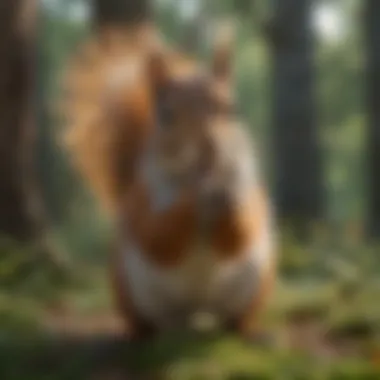
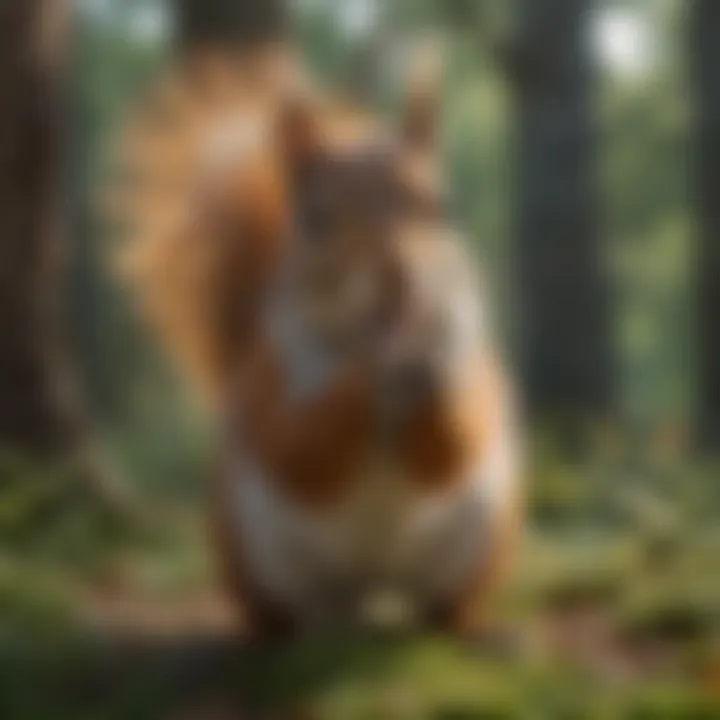
Using Scented Sprays
Scented sprays are another effective method to repel squirrels. These can be commercial products or homemade solutions using essential oils. The benefit of using sprays is their versatility in application. Homeowners can spray around the perimeter of gardens, on fences, or any other areas prone to squirrel activity.
When creating a homemade spray, it is important to ensure that the concentration of essential oils does not harm nearby plants. Spraying should occur early in the morning or late in the evening when the wind is calm, to prevent the scent from dissipating too quickly. Regular reapplication is necessary, especially in areas frequently disturbed by rain or wind.
Creating Scent Barriers
Creating scent barriers can be an effective strategy for keeping squirrels at bay. This involves placing scented materials around the boundaries of your garden or the areas where squirrels are unwelcome. Options include dried herbs, commercial repellents, or even cotton balls soaked in essential oils. By forming a perimeter, the strong scents can deter squirrels before they approach.
This method is particularly useful in gardens that are large or have varied access points. Scent barriers can offer a preventive measure, deterring squirrels from entering specific zones without direct application to plants. Homeowners need to monitor and refresh these barriers to maintain their efficacy.
Incorporating Scented Mulch
Incorporating scented mulch into garden beds is an innovative and long-lasting method of squirrel deterrence. Certain types of mulch, such as cedar mulch, have natural scents that repel many animals, including squirrels. Moreover, blending essential oils into mulch can enhance its repelling properties.
When applying scented mulch, it is essential to choose a product that complements the existing landscape and does not negatively impact plant health. This method not only provides a barrier but also enriches the soil as it breaks down over time. It also aids in moisture retention, making it a beneficial choice for gardening enthusiasts.
Considerations When Using Scent Deterrents
When exploring odor-based methods for deterring squirrels, there are several factors that need careful consideration. Relying on scents may seem straightforward, but various aspects can influence effectiveness, environmental health, and the broader ecosystem. Understanding these elements is crucial for homeowners and gardeners aiming for a humane and effective approach to wildlife control.
Environmental Impact
The application of scent deterrents must account for the environment. Many natural and synthetic scents can have varying effects on local flora and fauna. For example, essential oils like peppermint and citrus may not harm plants but can affect other wildlife. High concentrations of certain spices may lead to soil contamination or disturb beneficial insects. It's essential to choose natural alternatives when possible, as they tend to minimize the negative impact on the environment.
Additionally, understanding the habitat is fundamental. Introducing strong odors might disrupt the local biodiversity. Therefore, conducting a thorough analysis of the surrounding ecosystem can help mitigate any adverse effects.
Effectiveness Over Time
Scent deterrents often deliver immediate results, but their long-term effectiveness can vary significantly. Factors like rainfall, temperature, and UV exposure can degrade the potency of scents. For instance, if you use vinegar or other liquid solutions, they require regular reapplication, especially after rain. Likewise, oils and strong spices may lose their efficacy over time and may need refreshing to maintain their deterrent properties.
It is also important to note that squirrels can become accustomed to certain smells over time. This habituation can reduce the effectiveness of deterrents, necessitating the rotation of different scents. Keeping a record of what works best in different conditions can significantly improve results over time.
Potential Harm to Non-Target Species
In applying scent deterrents, there is always a risk to non-target species. These can include beneficial insects, birds, and other small mammals. Some scents may deter squirrels effectively, but they can also impact pollinators or predators, ultimately disrupting the local food web.
When selecting scents, one should consider their implications beyond just squirrel behavior. Certain agents may be safe for squirrels but not for other wildlife. It is advisable to research and choose scents that are effective but pose minimal risk to non-target species.
Conclusion: By taking a thoughtful approach to using scent deterrents, homeowners can protect their gardens and homes while safeguarding the ecological balance. Adopting a strategy that considers environmental impact, effectiveness over time, and the well-being of all species will result in a more sustainable solution.
Comparative Analysis of Chemical Deterrents
Understanding chemical deterrents is crucial when addressing squirrel control. An effective solution must consider the efficacy of various products. Homeowners need to be informed about the distinctions between natural and synthetic options. This awareness assists in selecting the most suitable methods based on specific preferences and environmental considerations.
Natural vs. Synthetic Repellents
Natural repellents derived from plant-based sources have gained popularity due to their safety and environmental friendliness. Essential oils such as peppermint and citrus are common in this category. These scents can be pleasant for humans while being overwhelming for squirrels.
On the other end, synthetic repellents often use chemicals that may have stronger deterrent effects. However, they can pose risks to both the environment and non-target species. Synthetic options may contain substances that could harm beneficial insects or other wildlife.
When selecting between natural and synthetic repellents, consider factors such as:
- Safety and Environmental Impact: Natural repellents tend to have a lower toxicity profile.
- Effectiveness: Synthetic ones might work faster and more efficiently in some cases.
- Longevity: Natural options may require more frequent application.


In sum, both types offer benefits and drawbacks. Homeowners must decide based on their values and specific squirrel problems they face.
Longevity and Efficiency
Longevity is a significant factor in the success of chemical deterrents. A repellent's duration of effectiveness can vary substantially between natural and synthetic options.
Natural repellents generally have a shorter lifespan. Factors such as rain and strong sunlight can diminish their scent quickly. Consequently, applications may need to be repeated more often to maintain their effectiveness. For instance, peppermint oil may evaporate rapidly, especially on warm days, necessitating reapplication every few days.
In contrast, synthetic repellents often last longer. Their formulation can include stabilizers that allow the scent to persist longer under adverse weather conditions. Some synthetic options might only need reapplication every few weeks or even months, offering a more extended window of deterrent action.
Yet, it is crucial to balance longevity with safety. Homeowners should be aware of how synthetic chemicals may react with the environment, and thus they might consider occasional use alongside more gentle natural alternatives.
Ultimately, making an informed decision requires understanding both longevity and efficiency of each type of repellent. Consider your garden's unique needs and environmental conditions to ensure the best squirrel deterrence.
Case Studies on Squirrel Deterrence
Understanding the real-world effectiveness of scent-based deterrents against squirrels is critical. Case studies provide evidence that can either validate or challenge theoretical approaches discussed previously. These studies allow homeowners and gardening enthusiasts to see practical implications in both urban and rural settings. They can also highlight specific benefits and drawbacks of using smells as a deterrent.
Community Garden Results
In many community gardens, residents have implemented various odor-based deterrents to protect their crops from squirrel damage. One significant case study involved a community garden in Portland, Oregon, where gardeners experimented with peppermint oil. They dispersed the oil in specific areas of the garden and noted a marked decrease in squirrel activity.
Results indicated:
- Peppermint Oil Application: 90% reduction in sightings of squirrels over three months.
- Combined Use of Cayenne Pepper: Enhanced effectiveness, leading to a 95% drop in visits.
- Comparison with Vinegar Solutions: Vinegar showed minimal impact, often failing to deter squirrels effectively.
Following the peppermint oil success, community members shared their findings on platforms like Reddit and local forums, encouraging others to test similar methods. This led to a broader awareness of how non-toxic methods can be implemented in shared spaces, promoting ecological balance while keeping gardens safe.
Urban Settings vs. Rural Settings
The case for using scent deterrents varies significantly between urban and rural environments. Urban settings, with their proximity to human activity and fewer natural predators, often see squirrels adapt more readily to deterrents. In contrast, rural areas tend to have more diverse wildlife and a greater availability of alternative food sources.
In a study conducted in an urban neighborhood in Chicago:
- Garlic and Onion Scents: Demonstrated limited success, with only about 40% of participants reporting reduced squirrel visits.
- Scent Barriers: Residents noted that while barriers lessened instances of squirrel raiding, squirrels would often find ways around them.
Conversely, a similar study in a rural garden near Asheville, North Carolina, found that:
- Natural Deterrents: Homeowners effectively deterred squirrels using citrus scents as a barrier, achieving a success rate of 80%.
- Long-Distance Repellents: These proved more efficient in open spaces, where squirrels had fewer distractions from human activity.
"Scent deterrents can be remarkably effective, but the context of application is crucial. What works in one environment may not work in another."
This comparison shows the importance of understanding the specific habitat and behaviors of squirrels. It emphasizes the need for gardeners and homeowners to tailor their approaches based on their unique environments. By studying case examples, readers can draw insights that are actionable and relevant to their situations.
Epilogue: Integrating Smell-Based Strategies
The use of smell-based strategies for deterring squirrels is a practical and effective method for homeowners and gardening enthusiasts. This conclusion evaluates the importance of integrating these strategies in daily practices. Smells that repel squirrels serve not only to protect gardens and homes but also contribute to maintaining a balanced ecosystem. It is essential for individuals to comprehend how these strategies can be interwoven with existing methods of wildlife management.
Summary of Key Findings
In summary, several key points emerge regarding the use of smell deterrents:
- Variety of Effective Scents: Peppermint oil, cayenne pepper, vinegar solutions, garlic, and citrus scents are notable for their success at repelling squirrels. These substances exploit the acute sense of smell that squirrels possess.
- Application Methods Are Crucial: Employing proper methods of applying these scents greatly affects their effectiveness. Direct applications on plants and utilizing scented sprays are among methods employed by enthusiasts.
- Environmental Considerations: Understanding the impact of these scents on the surrounding ecosystem is necessary. While they help protect gardens, potential harm to non-target species should be evaluated.
"Implementing smell-based repellents is a step toward harmonious coexistence with local wildlife."
Adopting a Holistic Approach
A holistic approach incorporates not only scent-based strategies but also additional measures for effective squirrel control. This includes physical barriers such as fencing and traps. The goal is to address the problem comprehensively without harming the environment. For instance, when using scent deterrents, it is wise to monitor their effects over time, adjusting as necessary.
By combining methods, gardeners can achieve better results. Using scents while also promoting natural predators, such as owls, can reduce squirrel presence more effectively. This multifaceted approach will aid in creating gardens that flourish while minimizing squirrel disturbances. Homeowners should approach the challenge with a strategy that balances efficacy, safety, and sustainability.



